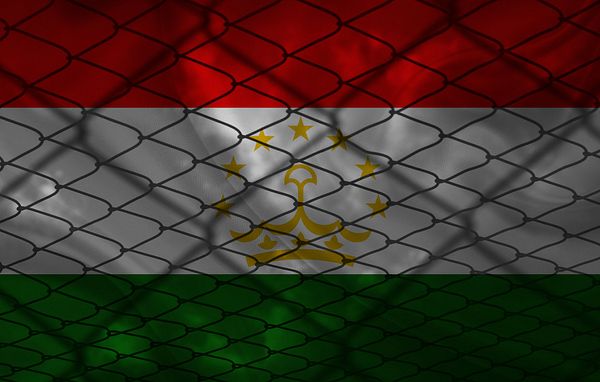On May 19, 2015, an outspoken 24-year-old critic of the Tajik government left his apartment in Moscow and disappeared. Ehson Odinaev – who was known on social media as “Sarfarozi Olamafruz” – was a member of Group 24 and Youth of Tajikistan for Revival (YRT), related Tajik opposition groups, the latter formed among the Tajik diaspora in Russia. He hasn’t been heard from since.
As Steve Swerdlow, a rights lawyer and Associate Professor of the Practice of Human Rights at the University of Southern California, recounts in a new report, Odinaev’s family fears “he was forcibly disappeared by Tajik authorities, returned to Tajikistan, and is being held incommunicado there or has been killed.”
Tajikistan’s deteriorating human rights record and use of transnational repression has drawn considerable attention in the last decade as the administration of President Emomali Rahmon consolidated its nearly three-decade grip on power in the country. “[F]ar less attention has been directed toward the international crime of enforced disappearances and the closely related abuse of incommunicado detention, which the government has increasingly used as systematic and widespread tools of repression” in recent years, notes the summary of a new report from Crude Accountability, authored by Swerdlow and part of a series examining enforced disappearances as a repression tactic across the Organization for Security and Cooperation in Europe (OSCE) area.
“Enforced disappearances – when a government detains, captures, imprisons, or kills a detainee and refuses to acknowledge the person’s whereabouts – are one of the most pernicious crimes under international law,” Swerdlow told The Diplomat.
Diplomat Brief
Weekly Newsletter
Get briefed on the story of the week, and developing stories to watch across the Asia-Pacific.
Get the Newsletter
Enforced disappearances, or the threat that one may simply vanish from the Earth, trigger a particular type of terror for both victims and their families, Swerdlow said. By fully isolating the disappeared person, the authorities subject his or her loved ones to continuous anguish, constant anticipation, and [deny] them closure.”
The tactic – a central feature, Swerdlow noted, of the juntas and dictatorial regimes that took power across Latin America in the 1970s – “ appeared as a weapon of war during the 1992-1997 civil war” in Tajikistan. The scope of its use then is unknown.
The report focuses on the post-civil war period, breaking the Rahmon regime’s use of enforced disappearances into three phases. In the first phase covered, roughly 2002 to 2012, “Rahmon was testing this abuse on a wide array of perceived opponents.” In the second phase, from 2012 to 2022, there was a methodical campaign aimed at eliminating political opposition and concerned organizing among civil society, namely targeting Group 24 and the Islamic Renaissance Party of Tajikistan (IRPT). In the present era, “almost an equal or greater number of enforced disappearances and cases of incommunicado detention have been documented against Pamiris as all of the previous years combined.”
The targets of these tactics have been diverse, ranging from organized political opponents – such as leaders and members of Group 24 and the IRPT — to journalists, lawyers, real and perceived government critics, and even foreign researchers. The most recent phase has featured a distinct targeting of Pamiri activists, as well as cultural and sports figures.
Advertisement
The usage of enforced disappearance as a repressive tactic is tightly bound with transnational repression. Of the 27 cases of enforced disappearance profiled in the recent report, 14 involved individuals taken from – or coerced to leave – Russian soil. Others were taken, or forced out of, Turkey, Belarus, and even western European countries like Austria and Germany.
“Owing to Tajikistan’s historically large diaspora and millions-large population of migrant workers in Russia,” Swerdlow explained, “Rahmon has long trained his sights on dismantling the capacity of the peaceful opposition to organize supporters in Russia and also on depriving dissidents the ability to seek safe harbor in places such as Turkey.”
Although Tajikistan is the poorest post-Soviet state, “partnering with Russia’s security services to kidnap its perceived critics allowed Tajikistan to punch above its weight,” Swerdlow noted.
“The complicity of Russia, Turkey, and Belarus in transnational repression led by Tajikistan may not surprise us,” he said. “But the more recent phenomenon in which established democracies such as Poland, Germany, and Austria have returned Tajik asylum-seekers to Tajikistan where they have been held incommunicado and then imprisoned to lengthy terms is not only deeply shameful, but raises serious questions about the need to place Tajikistan’s abuse higher up on the international agenda.”
In that vein, the report recommends that Tajikistan’s partners call both publicly, and in their private engagements with Tajik officials, for Dushanbe to both sign and ratify the International Convention for the Protection of All Persons from Enforced Disappearance (ICPPED) as a first step. The report also calls on the OSCE, United States, European Union, and others to “raise the imprisonment of human rights defenders, journalists, lawyers, and peaceful political activists at every possible opportunity, attaching meaningful policy consequences to Dushanbe’s continuing human rights crackdown both with regard to civil society and the media sphere and in particular in the Gorno-Badakhshan Autonomous Oblast (GBAO).” Finally, Swerdlow argued that Tajikistan’s partners in the West must “be willing to use ‘Global Magnitsky’-style targeted sanctions against the individual perpetrators in the Tajik government responsible for this policy.”
On Tajikistan’s side, in addition to acceding to the convention noted above and releasing those unjustly detained named in the report, it recommends Dushanbe establish “a simple, accessible, centralized nation-wide system of registration of all persons deprived of liberty… for families to quickly locate their loved ones.”
Such a registry is perhaps the lowest hanging of fruit, and yet may remain out of reach for Tajikistan’s authorities. The fear and uncertainty created by these repressive tactics is exactly the point.

